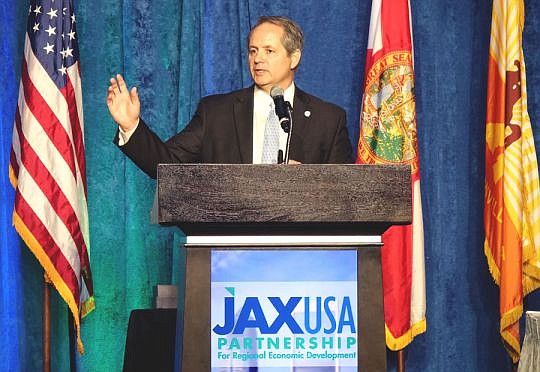
Florida Chamber of Commerce President and CEO Mark Wilson said Wednesday the Legislature’s decision to cut requested funding for economic development and tourism already has affected business decisions.
“Bottom line, if you look at the macro numbers, there’s an immediate chilling effect,” Wilson said about the message he said it sent to CEOs nationwide who might consider Florida for expansion or relocation.
“Usually we’ll have over 100 companies in the pipeline statewide at any given time,” he said. “Right now, we have fewer than 10.”
Wilson spoke to about 400 members and guests at the JAXUSA Partnership’s second-quarter membership meeting at the Hyatt Regency Jacksonville Riverfront. JAXUSA Partnership is the economic-development division of the JAX Chamber.
In an interview after the meeting, Wilson said current job-creation announcements are the result of past efforts.
He sees the effects of the funding levels now in the state budget playing out in the coming years.
Wilson also said Florida’s job growth isn’t keeping up with the increase in population.
“We created fewer jobs over the last 12 months than we did over the 12 months prior to that,” Wilson said. “When you have a growing population, you’d think it would be the other way around.”
Wilson said two of the biggest impediments to progress are the lack of funding for Visit Florida, the state’s marketing and tourism arm, and for Enterprise Florida Inc., a public-private partnership responsible for state incentives to recruit new and expanded businesses.
Gov. Rick Scott asked the Legislature for $85 million to expand incentive programs for Enterprise Florida, but lawmakers allotted $16 million. The organization received $23.5 million in 2016.
Scott also requested $100 million for Visit Florida, only to receive $25 million in the latest state budget. It’s also a $50 million cut from the $75 million the agency received in 2016.
Scott received the $82.4 billion state budget from legislative leaders Wednesday. A new budget must be in place by July 1 and Scott is reviewing it.
While he was critical of the funding level for Enterprise Florida, Wilson said incentives “are almost always inappropriate, truth be told,” meaning that companies should seek out the state for its attributes and not just taxpayer assistance.
“Our legal climate, our education system, our tax structure, those are the things that drive most jobs,” he said. “About 98 percent of jobs are generated by our business climate, not by incentives.”
Wilson said the state’s legal climate is not ideal and that “big-name trial lawyers” are making economic-development prospects uneasy through what he called “bad faith legislation that allow lawyers to string-out litigation.”
He also said he believes influence from “billionaires” that he said have no real interest in Florida’s economic growth have started to play a part in the legislative process.
He suggested they might be a reason Enterprise Florida and Visit Florida didn’t gain support from some of Scott’s Republican colleagues.
At a Florida House Careers and Competition subcommittee hearing Jan. 11, Fatima Perez, the regional manager of state government affairs for Koch Companies Public Sector, gave his support to Rep. Richard Corcoran’s fight against Enterprise Florida and Visit Florida, calling the programs “corporate welfare.”
“If you didn’t know this, the Koch Brothers have 90 full-time employees working to get rid of Enterprise Florida,” Wilson told the crowd. “I have 42, just to put that in perspective.”
Wilson said all of those issues are causing site selectors to view Florida less favorably this year. Site selectors identify locations for relocation or expansion for their corporate clients.
“They’re saying, ‘you know we really liked the direction that Florida’s has been headed in, but we’re hitting the pause button, because we’re nervous about what the Legislature’s doing,’” Wilson said.
Wilson said site selectors are looking negatively at how state lawmakers dealt with issues important for business development.
“We made workers’ comp higher for small businesses, when we made homeowners insurance rates higher for business owners and their employees, and when we took incentives off the table,” Wilson said.
Didi Caldwell, a principal with Greenville, S.C.-based Global Location Strategies, echoed those concerns.
“Any time there is a funding cut or a shake-up at a state organization, we worry about continuity and service level,” said Caldwell, who has been in site selection for more than 20 years. Her advisory firm specializes in manufacturing companies.
She said Florida already lags states like Texas, South Carolina and Georgia, whose economic development is largely driven “through local option sales taxes.”
Caldwell said that for the most part, Southern states are doing well with economic development because they understand the effects of shifting demographics, changes in energy costs and are creating a business-friendly regulatory environment.
“And with a few exceptions, they have strong state organizations,” she said.
Caldwell said local chambers of commerce and other economic development partners seem to understand the challenges facing Florida’s economy in recruiting companies.
“We know these things because we have worked in the state and because we have strong relationships with state and local economic developers,” she said.
“They carry some of the load and fill in the gaps,” she added, “but they can’t do it all.”
(904) 356-2466